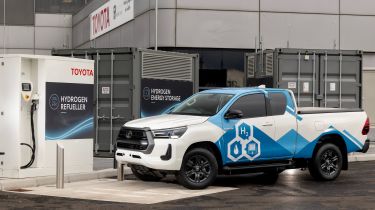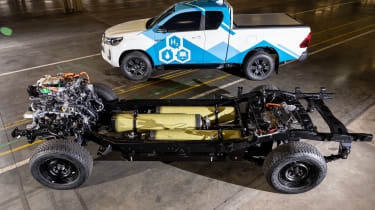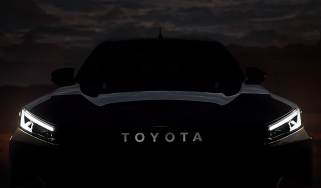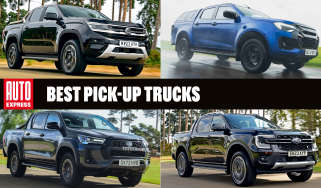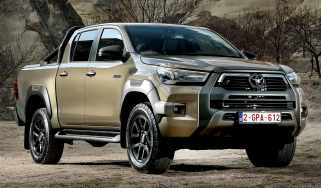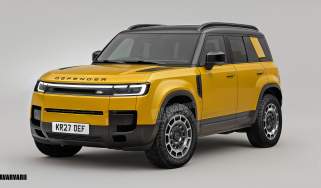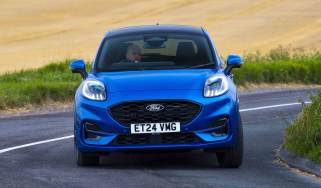Hydrogen Toyota Hilux FCEV revealed ahead of UK trials
Toyota has responded to customer demand for zero emissions pick-up trucks with a fleet of hydrogen fuel cell Hilux models set for trials with UK businesses.
Toyota has revealed a hydrogen-fuelled version of its iconic Hilux pick-up truck, developed in the UK using powertrain components from the Mirai fuel-cell electric vehicle (FCEV).
The prototype vehicle with its decidedly ‘old school’ rugged ladder frame chassis may seem an incongruous home for Toyota’s latest fuel cell technology, but the company says it has corporate fleet customers who urgently want to decarbonise vehicle fleets, for whom battery-powered EVs are not suitable due to range, load-carrying or charge point access limitations. They are eager to sample hydrogen-fuelled alternatives, and following Toyota’s own internal evaluations, as many as 10 Hilux FCEV prototypes will begin trials with potential customers next year.
The project itself has been part-funded by UK taxpayers via a £5.6m grant awarded by the Advanced Propulsion Centre which promotes technology developments in the automotive sector, and the wide range of project partners includes Ricardo, D2H and Thatcham Research.
The Hilux uses Toyota’s second-generation fuel cell, as used in the Mirai and a raft of other products from boats to generators, located under the bonnet in place of the usual diesel power plant. Drive is provided to the rear wheels via an electric motor, while three 7.5kgs-capacity carbon-fibre hydrogen tanks - the largest of the three tanks fitted to the Mirai - are shoe-horned between the chassis rails at the centre of the vehicle. That’s enough, says Toyota, to give the fuel-cell Hilux a range greater than 365 miles between rapid hydrogen fill-ups. There’s also a large hybrid battery located behind the cab in the pick-up bed, as like the Mirai the Hilux FCEV uses a combination of battery power and energy direct from the fuel cell in different driving scenarios. The hybrid battery is charged via regenerative braking.
While happy to reveal the technical make-up of its latest prototype, Toyota remains coy when it comes to vital statistics. No information has been provided on vehicle weight, performance or load-carrying ability, although we estimate around 20 per cent of the load bed is taken up by the module containing the hybrid drive and 12v system batteries. Similarly, Toyota won’t be drawn on the likely cost, or even the production future of a fuel-cell powered Hilux, with president and MD of Toyota GB Agustin Martin telling Auto Express that success of the project depends on user feedback.
“Customer appetite is going to define the commercial viability of the product, and this gives us an opportunity here in the UK to really understand what the real needs are,” he says, citing industries such as mining, farming and the emergency services that require vehicles capable of heavy duty work cycles not suited to battery EVs.
Although the Hilux prototype is an interesting proposition for potential customers, it’s a moot question whether Toyota would commercially release a vehicle based on the existing generation Hilux when a new and bespoke platform would bring myriad advantages in terms of packaging, performance and manufacturing.
However the prototype fuel-cell Hilux also has an important public relations role in Toyota’s drive to raise the profile of Hydrogen as a future transport fuel here in the UK, where the government has been slow to acknowledge potential beyond heavy haulage and energy-intensive industrial applications. That’s in stark contrast to the rest of Europe, where nations have agreed to install hydrogen filling stations in all major cities and at least every 200kms along major roads by 2030.According to Martin, that’s partly why the £5.6m taxpayer investment - a relative drop in the ocean for Toyota - is significant.
“Public investment is required because, to try and explore new avenues for the future, you need to have the support, the understanding, and the willingness from the regulator,” he told us. “I don't think the relevance is on the money itself. It's more about, okay, when there is money, there is going to be accountability, and there is going to be a keen interest to make sure that at least you will try it to make it work, because it's seen as an investment.
I think it's a way to prove that there are many ways to respond to the challenge of decarbonisation, and that we should explore as many as possible.”
Now check out our review of the Vauxhall Vivaro-e Hydrogen here…

